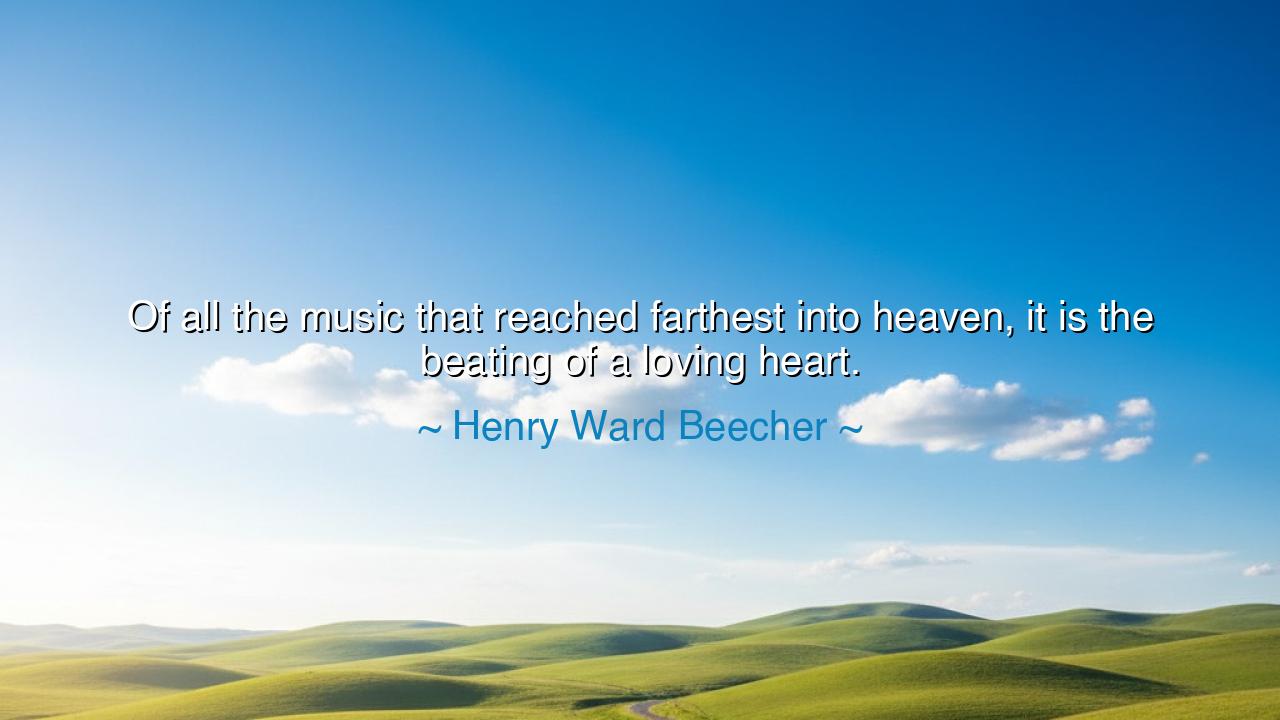
Of all the music that reached farthest into heaven, it is the
Of all the music that reached farthest into heaven, it is the beating of a loving heart.






Henry Ward Beecher, the great preacher and orator of the nineteenth century, once declared: “Of all the music that reached farthest into heaven, it is the beating of a loving heart.” In these words he speaks a truth that surpasses theology, art, and philosophy alike—that no instrument, however skillfully played, no choir, however angelic in voice, can rise higher than the sound of love pulsing within the human soul. For the heart, when moved by compassion and tenderness, sends forth a music not of sound but of spirit, a melody that heaven itself delights to hear.
The origin of this thought lies in Beecher’s own life and ministry. As a man who fought for the abolition of slavery, he understood that words alone could not break chains—only the living power of love could reach both the oppressed and the oppressor. In his sermons, he often raised his voice like thunder, but beneath that thunder was the gentle beating of a heart that longed for freedom, mercy, and brotherhood. Thus he saw that the most powerful song of all was not sung by choirs, but by souls who lived with loving hearts.
History offers us many echoes of this truth. Consider the life of Florence Nightingale, who walked through the wards of war-torn hospitals, not singing hymns aloud, but moving with quiet tenderness, touching the sick, and offering comfort. Her footsteps, her whispered words, her tireless hands—all were the beating of a loving heart. The soldiers who saw her lamp in the night heard in it a music far sweeter than any anthem: the music of love that reaches heaven by lifting human suffering.
Another tale shines from the life of Mother Teresa of Calcutta, who once said that we cannot all do great things, but we can do small things with great love. Her voice was not trained for choirs, her hands did not play instruments, yet the sound of her life was a symphony of compassion. By holding the dying, by feeding the hungry, by embracing the forgotten, she created a music that rose farther than any earthly hymn, for it was the pure rhythm of a loving heart.
The deeper meaning of Beecher’s words is this: that love transforms ordinary life into worship. A kind word is a note of the eternal song; an act of forgiveness is a chord that rings through the heavens; a life lived in compassion is a symphony that no cathedral organ can rival. The heart that beats with love becomes itself an instrument of divine harmony, joining the great music of creation. This is why he declares that it “reaches farthest into heaven”—because heaven is not stirred by empty sound, but by love embodied in action.
The lesson is clear, O children of tomorrow: if you wish to live in a way that touches eternity, do not measure your worth by the brilliance of your speech or the splendor of your song. Instead, let your heart beat with love. Speak kindly, forgive freely, act with mercy, and serve with joy. For such acts send forth music that angels cannot help but echo. The world remembers voices that sing for a moment, but heaven treasures hearts that love forever.
Practical wisdom follows: each day, choose to create music with your life. Comfort one who sorrows, encourage one who doubts, love even when it costs you dearly. In these choices, you compose the greatest hymn. Do not wait for grand opportunities—begin with the smallest notes, and soon the melody of your days will rise like incense.
Thus Henry Ward Beecher’s words endure, a timeless song for every generation: “Of all the music that reached farthest into heaven, it is the beating of a loving heart.” For the world is full of noise, but heaven listens for love. Let your heart, then, be the drum of compassion, and your life the song that rises beyond the stars.






AAdministratorAdministrator
Welcome, honored guests. Please leave a comment, we will respond soon